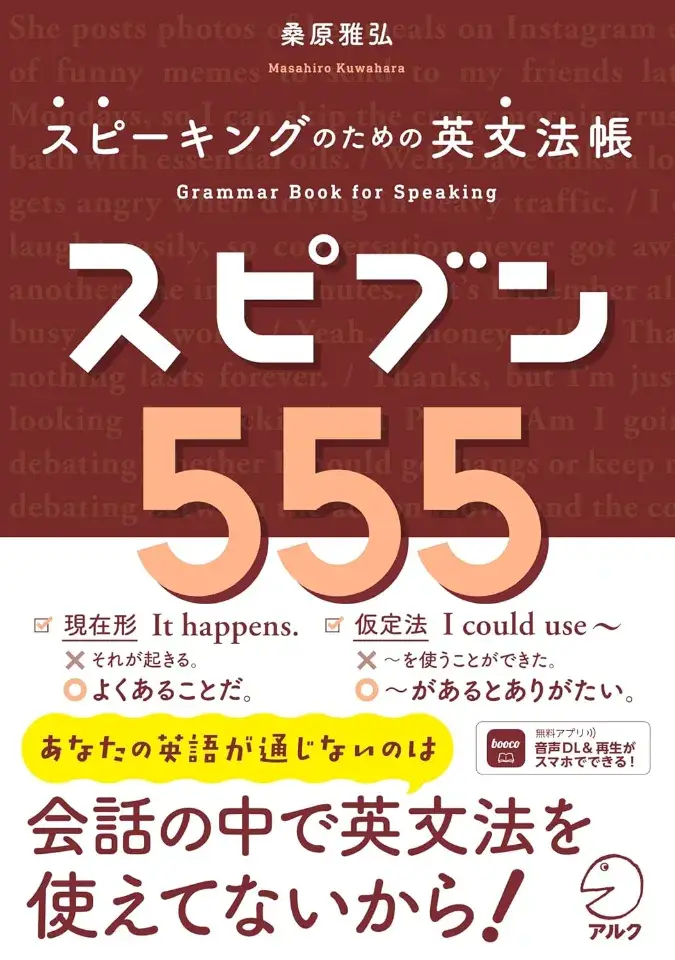
近年、日本では「あざとい」が悪い意味だけでなく、いい意味でも使われるようになってきましたが、海外では そもそも どのように考えられているのでしょうか?英会話講師のサマー・レインさんが、日本・海外のゲスト3人(Koさん/Kyokaさん/Takさん)と共にオンライン討論会を行いました。今回は「人に好かれるテキストメッセージとは?」について討論します。
前編・中編はこちら!
ej.alc.co.jp ej.alc.co.jp人に好かれるテキストメッセージとは?
Ko: I know that it might be different in certain contexts, like professional or with friends or something like this. But especially with texting, it’s hard to (1)get across emotion, right ? So it’s really convenient now that we have emojis and stamps and this kind of thingsthing] that we can [use .
Tak: Yeah, (2)same here. I don’t think I ever close a text with a period or like a “maru.” I always have an (3) exclamation . I usually have two exclamation marks. Or like an emoji.
Summer: That’s super interesting, because I always end with a period . I’m not like a(n) emoji user. But I often experience that people misinterpret what I said. So I should probably use more emojis in my conversations with people. I write a lot of emails than texts. Emails are totally different , too. You have to (4)proofread in English(emails). You have to be friendly but professional at the same time . It’s a really interesting balance . Some people you can be a little bit more friendly, some people a little bit less . I tend to go in the “(5) Best regards , first name, last name,” like more proper email directi?(6) just in case . I definitely think like in an English-speaking context , people are really, really casual, even in their emails these days.
Kyoka: I wanna say this, it’s really hard to write an English business letter, for me. Because Japanese, you have all these words that pretty much (7)sums up all of your emotions for you, like, “Yoroshiku onegaishimasu.” “Otsukaresama desu.” (8)When it comes to English, how am I going to say all this in English? And then in general , again Ko said, it’s really hard to express emotional-wise. But when it comes to my friends and stuff , when I’m hyper, (9)all caps. Um, English, it’s normal to write, like, 1, 2, 3, 4, 5 (10)bubbles at a time . But in Japanese, if you do that, they get annoyed. But if that one bubble’s too long, then they can’t read it. I first write it and then I imagine how they’re gonna see it. And then I start deleting sentences. And then I separate two small messages that are somewhat long, and I (11) send it over , and wait until they reply , and then I answer, for that.
コウ: 仕事または友達といった関係など、状況によって違うでしょうね。でも特にテキストメッセージについては、感情を相手に伝えるのが難しいですよね?それで今は絵文字やスタンプみたいなものがあって、それを使えてすごく便利です。
タク: ええ、自分もそうです。僕はメッセージをピリオドや「。(マル)」などで終わらせることはないと思います。いつもビックリマークです。だいたいビックリマークを二つ使います。それか絵文字とかですね。
サマー: それはすごく面白いですね、私はいつもピリオドで終えてしまうから。私は絵文字ユーザーではありません。でも私の発言を人が誤解することがよく起こります。だから私は人との会話にもっと絵文字を使うべきでしょうね。
私はテキストメッセージよりずっと多くメールを書きます。メールもまったくの別物です。英語(のメール)で校正する必要がありますから。感じよく、しかし 同時に プロ意識を持っていなければなりません。とても興味深いバランスです。ある人にはちょっと親しみを込めたり、別の人には(フレンドリーさを)少し減らしたりします。私はどちらかといえば、「敬具、名前、名字」のように続く、より正式なメールにします、 念のため 。英語圏では、最近はメールでもみんなすごくカジュアルだということ、これは確かなのではと思います。
京香: 私が言いたいのは、私にとって英語のビジネスレターを書くのはすごく難しいということです。というのも、日本語ではすべての感情をまとめた表現がたくさんあって、例えば「 よろしく お願いします」「お疲れさまです」のような。これが英語になると、こういったすべてを英語でなんて言えばよいのでしょう?
そしてコウさんが言ったように、感情を表現するのも概してすごく難しいです。でも友達などが相手なら、私はテンションが高いときならすべて大文字にします。英語では、1度に5個ぐらいの吹き出しで書いても普通です。けれども日本語でそれをすると、嫌がられます。でも、1個の吹き出しがあまりにも長かったら読めないでしょう。私はまず書いて、相手がどう読むか想像します。そして文を削除していく。それからちょっと長いメッセージを短く二つに分けて、それを送って、相手の返信を待って、それに答えます。
(1)get across ~ ~(考えなど)をわからせる (2)same here まったく同感で (3) exclamation 感嘆 ★ ここでは exclamation mark (感嘆符)の意味合いで使われている。 (4)proofread 校正する (5) Best regards 敬具 ★手紙などの結びの言葉。 (6) just in case 念のため (7) sum up ~ ~を要約する (8)when it comes to ~ ~ に関して 言えば (9)all caps すべて大文字にした表記 (10)bubble 吹き出し ★ここではメッセージアプリなどのトーク画面の吹き出しのことを言っている。 (11) send ~ over ~を送信する
人に好かれるために気を付けることは?
Kyoka: (People) That couldcan] be open and honest [with their feelings are very charming . And to be able to just naturally do something because they naturally just want to , is something really difficult, in both , a foreign community, both in a Japanese community, both in any community in general .
Summer: I would say that, if I (2)generalize into one sentence what I think a good person or a truly popular person, or someone that is actually liked by everybody, and so , actually everybody that they meet feels good when they, after talking to them. I think that’s the main thing ? it feels good to be around them. They usually have a good sense of humor. They’re (3)forgiv?if their friends make mistakes, say, “That’s OK, it’s not a (4)big deal .”
I think also good listeners, probably. Everybody wants to be heard, I think. We all probably need a (5)therapist. We all have like, especially now that it’s a pandemic, I think everybody has a lot of inner (6)turmoil. And then when you listen to the person, you don’t judge them or (7) force your views on them. “Oh, you shouldn’t do that,” or “I don’t agree with you there.” You can just listen and say, “ Well , OK, you feel that way. I understand. That’s cool.” And so , their (8)compassion is also really important, I think. So I think those are all the sort of different (9)traits of someone who it feels good to be around .
Ko: I definitely agree that someone who’s (10)nonjudgmental and keep(s) an open mind. Like Summer said, someone who’s a good listener is probably someone that you can really talk to and feel like you can be open with , I think is really important. But I just wanted to kind of mention something, just about, or ( rather ) (11)intercultural communication in Japan. And there are people who want to learn English, and they think that by using (12) slang or, it sounds cool, or it sounds really friendly, or that it’s OK to be super open when they speak English, but it kind of , or (13)rubs off the wrong way.
There are some people who are like, even at my job they wanna talk with me in English, and then they start (14)swearing or something, I’m like ? “Wow, you should not be saying that here!” It’s, just seems really rude, but they think that it’s normal. So I think like knowing this kind of cultural (15)boundaries, especially in intercultural communication , can determine how likable you are, I guess. So it’s always good to be polite, I think. And being friendly is nice, but knowing how friendly or (16)reading the room, ha-ha, this kind of thing.
京香: オープンで、自分の感情を素直に出す人はとても魅力的ですね。ただ単純に「したい」と思って自然と行動できる、そういうのは外国でも日本でも、どんなコミュニティーであっても、概して本当に難しいことです。
サマー: 私が一言でまとめるとしたら、いい人や本当に人気のある人、それとみんなから実際に好かれている人、その人と話した後で誰もが実際にいい気分になるような人ですね。大事なのは―その人と一緒にいて気分がいい、ということかと思います。たいてい、ユーモアのセンスがある人です。寛容な人で、友達が間違いを犯しても、「大丈夫、大したことないよ」と言ってくれる。
聞き上手な人もたぶんそうでしょうね。誰もが自分の話を聞いてほしいのだと思います。おそらく誰もがセラピストを必要としているのです。特に今はパンデミックで、みんなが内面の不安を多く抱えていると思います。それから人の話を聞くときに、相手に評価を下したり、自分の考えを押し付けたりしない。「ああ、それはすべきじゃない」や「そこは賛成できない」とかね。ただ聞いて、「うん、そうだね、あなたはそう感じるんだね。わかるよ。それがいいね」って言うだけです。そのため、思いやりはやはりとても大切でしょう。一緒にいて気分がいい人には、これらのさまざまな特徴があるのだと思います。
コウ: 中立的で心を広く持った人だと、僕もまさに思います。サマーさんが言ったみたいに、聞き上手な人なら、たぶんこちらも話しやすくて心を開ける感じがするし、すごく大事だと思います。ただ、ちょっと言っておきたいことがあって、日本での異文化間コミュニケーションの(方の)話です。英語を勉強したい人がスラングを使って、それがクールまたはすごく親しみやすく聞こえるとか、英語を話すときはかなりオープンでOKと考えていますが、それはちょっと印象を悪くしてしまうのです。
僕の職場(英会話学校)ですらそういう人がいるのですが、英語で話 したがって 、ののしり始めたり―「げっ、ここでそんなこと言うのはまずいよ!」ってなるようなことを言ったり。それって本当に失礼なのですが、それが普通だと思っています。それで、こういう文化の境界線みたいなものについての知識が、特に異文化間コミュニケーションでは、その人の感じのよさの目安になるかなと思うのです。つまり、礼儀正しくするのは決まってよいことだと思います。親しみやすくということもよいのですが、どれほどの親しみやすさとか空気を読むといったようなことを、ハハハ、知っておきましょう。
Tak: I used to (19)be in sales when I was in Canada. So I really studied about how to talk to people to (20)try and make them like me so that they’ll buy whatever I’m selling, ha-ha, right ? There’s like specific things that you can do to get people to like you. You have to (21)genuinely like the other person.
One thing is I would (22) match the speed of the speaker of the other person. Like, so some people are really slow speakers, right ? I wouldn’t do it in a s?really unnatural way ? but I would like try and match the speed of the conversation to what the other person is comfortable doing. I would try to use everyone’s, the, the other person’s name a lot. That’s another specific thing that I do ? it’s the sweetest sound to the person’s ears, is their own name, is what they say. If they’re losing interest in what you’re talking about, say their name, and they’re like, “Oh, what?” And then you (23) bring their attention back. And when you’re listening to them talk, too, I would , like, (24) partially repeat what they would say.
Ko: I’m generally a pretty (25)curious person anyways, so I like to , if I meet someone new, I ask them questions. And if there is (a) topic that they like or that (26)they’re passionate about, maybe I don’t know a lot about, I ask questions. Uh, and then the conversation just kind of keeps going. And it’s not like I’m pretending to be (27)engaged. I’m usually always really engaged and I really like learning about people and their stories and this kind of thing. So I really like, I think I genuinely like to get to know that person.
Summer: I’m really trying to be a better listener. Um, my family is very (28)chatty, so I grew up with people sort of constantly ? the (29) flow of the conversation would be like: “Me, me, me.” “ No ! Me, me, me.” “Oh, you? Well , me, me, me.” “Oh, you? Well , me, me, me.” It sounds like a constant “me” battle. So , um, one thing that I often, I would like to improve upon is, I tend to offer advice when people talk about their troubles, or whatever. But I think that a lot of the times, people just want you to listen, um, and just be there for them. I think advice can (30)go down the judgment road sometimes. It can (31)put pressure on the person. And I think I just wanna be better at listening and not necessarily offering advice .
魅力的な人間に見せるために努力していることは?
タク: 私はカナダにいたとき、販売の仕事をしていました。それで、その人が僕を好きになって、その結果自分の売っているものがなんにせよそれを買ってくれるようにと、ハハハ、人への話し掛け方を必死に勉強しましたよ、そうでしょう?人に自分を好きになってもらうためにできる特定のことがあります。相手を心から好きにならなくてはいけません。
一つは、相手の話すスピードに合わせること。例えば、すごくゆっくり話す人っていますよね?(それに合わせることで)自分の話し方がものすごく不自然にはならないようにします―でも、会話のスピードを合わせようと努力して、相手がくつろいで話せるようにするのです。皆の、その人の名前をよく使うようにしています。それが、僕がしているもう一つのことで―人の耳にいちばん心地よく聞こえる音って、自分の名前だって言いますよね。相手が自分の話に興味をなくしていたら、相手の名前を言うのです、そうすると、「あ、なんですか?」となります。それでもう一度注意を向けてもらえます。相手の話を聞くときもそうですね、僕は相手の言ったことを一部繰り返したりします。
コウ: 僕は そもそも すごく好奇心が強い人間なので、新しく誰かと知り合ったら、質問をしますね。それで、何かその人が好きなことや熱中していることで、たぶん僕があまり詳しくないような話題があれば、質問します。そうして会話が続いていく感じです。それは、僕が(相手の話に)引き込まれているふりをするっていうのとは違います。いつもだいたい本当に引き込まれますし、人やその人のストーリーなんかを知るのがすごく好きなのです。だから、自分は本当にその人について知りたいのだと思います。
サマー: 私はもっと聞き上手になりたくて、本当に努力しています。うちの家族はとても話し好きで、常に人に囲まれて育って―その会話の流れは、「私ね、私、私」「いや!僕が、僕、僕」「え、あなた?ああ、私、私、私よ」「え、君?いや、僕、僕、僕だよ」のような感じでした。ひたすら続く「私」バトルのようでした。それからもっと上手になりたいとよく思うことは、人が自分の問題などについて話すとき、私はアドドバイスをしがちなのです。だけど多くの場合、人はただ話を聞いてほしいし、ただそばにいてほしいだけだと思います。アドバイスって、 判断 を下す方向に向かうときがありますよね。相手にプレッシャーを与えることがあります。それで私は聞き上手になりたいですし、必ずしもアドバイスをする必要はないと思っていす。
(1) charming 魅力的な (2)generalize 一般化する、総合する (3)forgiv? ★ここでは forgiving(寛大な、寛容な)と言おうと したと思われる。 (4)big deal 大事なこと、一大事 (5)therapist セラピスト (6)turmoil 不安、 動揺 (7) force A on B A を B に押し付ける (8)compassion 思いやり (9)trait(人の性格の)特徴 (10)nonjudgmental 偏った 判断 をしない、中立的な (11)intercultural 異文化間の (12) slang 俗語、スラング (13)rub off the wrong way 怒らせる (14)swear ののしる (15) boundary 境界線 (16)read the room (その場の)空気を読む (17) work toward ~を目指して努力する (18) make A into B A をB にする (19)be in sales 販売の仕事をしている (20)try and do ★= try to do。 (21)genuinely 心から (22) match the speed of ~ ~の速度に合わせる (23) bring ~ back ~を戻す (24) partially 部分的に (25)curious 好奇心の強い (26)be passionate about ~ ~に夢中である (27)engaged 没頭している (28)chatty おしゃべりな、話し好きの (29) flow 流れ (30)go down ~ ~に陥る、~にぶち当たる (31)put pressure on ~ ~にプレッシャーをかける
特集「モテ英語のルール10」をEJ6月号でチェック!
翻訳:吉田章子
日常生活にまつわる英語力を強化したい人におススメの参考書はこちら!


サマー・レイン(Summer Rane) アメリカ、シアトル出身。早稲田大学卒業後、東京大学大学院で研究を行い、現在はスタンフォード大学大学院言語学博士課程在籍。10年以上の英会話講師としての活動を基に、英語教材の執筆や、YouTubeで英会話コンテンツを配信中。
「サマー先生と英会話!」 https://www.youtube.com/channel/UC91qteXE1f8puKS8lEBRUhw
「サマー先生のなりきり英語音読」 https://www.youtube.com/channel/UCZMf6bG2KyIgr8v_UylBITg
boocoで読める!アルクの新刊、続々登場
語学アプリ「booco」なら、アルクのベストセラー書籍200タイトル以上が、学習し放題!
「キクタン」などアルクの人気書籍800冊以上が音声対応。「読む」に対応した書籍では、本文と音声をスマホで手軽に利用できるほか、一部の書籍では、学習定着をサポートするクイズ機能で日々の復習や力試しも可能です。さらに、Plusプランに加入すれば200冊以上の書籍が学習し放題に!
boocoの「読む」機能では、次のような使い方ができます。
① 学習したいページを見ながら音声を再生できる
② 文字サイズや画面の明るさを調整できる
③ 書籍内検索ができる
※ これらの機能には一部の書籍が対応しています。

▼「booco」の無料ダウンロードはこちらから








